Introduction
The Center for Public Integrity is a nonprofit newsroom that investigates betrayals of public trust. Sign up to receive our stories.
When President Donald Trump ordered a halt to aid to Ukraine last summer, defense officials and diplomats worried first that it would undermine U.S. national security. Ukraine is, as some of them later testified before Congress, on the front lines of Russian aggression, and only robust American support would fend off aggressive Moscow meddling in the West. This worry eventually helped galvanize congressional support for one of the two impeachment articles approved by the House of Representatives on Dec. 18.
But there was also a separate, less-noticed facet of the internal administration uproar set off by Trump’s July 12 order stopping the flow of $391 million in weapons and security assistance to Ukraine. Some senior administration officials worried that by defying a law ordering that the funds be spent within a defined period, Trump was asking the officials involved to take an action that was not merely unwise but flatly illegal.
The administration so far has declined to release copies of its internal communications about this vital issue — the legality of what Trump had ordered. On Friday, in 146 pages of new documents provided to the Center for Public Integrity under a court order, the Justice Department blacked out — for the second time — many of the substantive passages reflecting what key officials at the Pentagon and the Office of Management and Budget said to one another.
But considerable evidence is still available that those at key institutions responsible for distributing the Ukraine aid worried the halt potentially violated a 45-year-old law written to keep presidents from ignoring the will of Congress, according to public statements and congressional testimony
That law, known as the Impoundment Control Act, says that once Congress appropriates funds — like the Ukraine assistance — and the president signs the relevant spending bill, the executive branch must spend those funds. A president cannot simply ignore Congress’s direction, no matter how inconvenient or unappealing that instruction might be. If funds are withheld or shifted elsewhere, this cannot be done in secret, and Congress must approve.
But Trump’s decision to stop the aid was not announced, and no formal notification was ever sent to Congress. In an email on July 25, for example, as a senior OMB political appointee named Michael Duffey told the Pentagon’s comptroller about the aid halt, he said, “Given the sensitive nature of the request, I appreciate your keeping that information closely held to those who need to know to execute the direction.” Throughout this period, the reason for the aid halt was rarely discussed, even within the government. In an email on Sept. 11 – the day the funding halt finally ended — OMB official Edna T. Falk Curtain told a senior defense official that “I still have no insight on the rationale for the hold.”
Without a clear justification or any broader effort to gain congressional support, the officials overseeing the expenditure of the funds started hunting for legal guidance as soon as the order to halt the aid was given. When Trump’s political appointees told career officials not to worry, they still did.
“There was a report,” OMB director Mick Mulvaney told reporters at a press conference on Oct. 17, “that if we didn’t pay out the money it would be illegal, it would be unlawful.” He said it was “one of those things that has a little shred of truth in it, that makes it look a lot worse than it really is” because what he regarded as the deadline for spending the money did not fall until the end of September — two and a half months after Trump’s initial order.
To learn more, Public Integrity in late September petitioned the Office of Management and Budget and the Defense Department for copies of their communications about the aid halt. But the Justice Department so far — in two document releases on Dec. 12 and 20 — has chosen to conceal key passages in those documents. And the federal district court judge overseeing the case, Colleen Kollar-Kotelly, on Dec. 18 set a schedule for reviewing Public Integrity’s appeal that makes a final determination of the request unlikely to occur before March.
According to some of those involved in the funding halt, officials were deeply worried from the outset that a delay even for a few weeks could make it hard to ensure all the money was spent by that Sept. 30 deadline. DOD Comptroller Elaine McCusker, for example, noted what she called “increasing risk of execution” in an email on Sept. 5 to the Pentagon’s top lawyer and policy officials, among others, meaning she was worried the money could not all be spent by the end of the month.
We can’t do this work without your support.
After robust internal discussions, she and other officials did their best to carry out the policy, temporarily, by ordering a series of short-term holdups in the funding, while affirming in writing that they still planned to disburse it soon.
They specifically undertook an unusual maneuver, stopping the disbursements by adding a rare footnote to spending documents for Pentagon operations and maintenance efforts, which declared the Ukraine funding in particular was being held up for a week at a time. Then, over a period of about seven weeks, they tacked the footnote again and again onto eight such documents, each time as a temporary measure.
An unnamed lawyer at OMB, not wanting to participate in what appeared to be an illegal funding policy, decided to quit, as did another OMB official, according to congressional testimony by Mark Sandy, the office’s deputy associate director for national security and a 12-year veteran at the agency. OMB spokespeople have disputed the account, saying the resignations were not over the policy.
Others at OMB and the Pentagon meanwhile tried to organize a campaign inside the government to lobby Trump to let the assistance program proceed. They wrote memoranda to their bosses, held meetings to plot strategy and tried to persuade some of Trump’s cabinet-level appointees to approach him directly about it. But a discussion with Trump in mid-August by then-National Security Adviser John Bolton failed to persuade Trump to let the aid resume, and there is no record of other high-level officials such as Secretary of Defense Mark Esper or Secretary of State Mike Pompeo confronting Trump about it.
OMB initially blocked the State Department’s portion of the aid on July 3. That was exactly two weeks after Trump — according to a June 19 email from Duffey to the Pentagon’s comptroller – noticed a newspaper article about the Pentagon’s plan to proceed with the aid. “The President has asked about this funding release, and I have been tasked to follow-up with someone over there to get more detail,” the email said.
A separate note sent by a senior aide to the Secretary of Defense to others there said on June 24 that the White House wanted to know in particular if U.S. firms were providing the aid, and how much assistance was being provided to Ukraine by U.S. allies. (The answer was that “dozens of vendors are U.S. companies” and many other countries were supporting Ukraine, according to a copy.)
Who We Are
The Center for Public Integrity is an independent, investigative newsroom that exposes betrayals of the public trust by powerful interests.
Trump’s formal order blocking the Pentagon’s portion of the aid was nonetheless communicated to OMB by one of his aides on July 12. The first footnote depicting a temporary funding holdup was signed by Sandy on the evening of July 25, the same day as Trump’s controversial phone call with Ukraine’s president, Vlodymyr Zelensky.
During that call, Zelensky said he wanted to continue military cooperation with America and that “we are almost ready to buy” more anti-tank missiles. Trump responded that “I would like you to do us a favor though,” and listed two investigations he wanted Zelensky to order: One was about Ukraine’s alleged support for Hillary Clinton in the 2016 U.S. presidential election and the other was about lucrative business ties that former Vice President Joe Biden’s son, Hunter, established with a company in Ukraine.
There was, Trump’s ambassador to the European Union Gordon Sondland has testified, what amounted to a “quid pro quo” being offered, in which Zelensky could get a White House meeting with Trump and a release of the aid in return for promising the investigations. This was, according to the testimony of Fiona Hill, Trump’s top former White House adviser on Russia, the real reason the aid was withheld.
The deferral order signed by Sandy — using language worked out with the advice of legal counsel at the Pentagon and OMB — stated that the rationale for the holdup was to “to allow for an interagency process to determine the best use of such funds.” But no such reexamination of the Ukraine spending plan was actually under way, according to key officials, other than frantic meetings aimed at getting the flow of funds started.
Restrained by a law passed to control Richard Nixon
Many presidents have chafed at having to share their spending role with Congress, but the rule blocking a presidential withholding of congressionally approved funds has been upheld by federal courts and is well known to officials responsible for overseeing the annual flow of $4.4 trillion out of the federal treasury.
To Laura Cooper, an 18-year veteran of the Defense Department who is now the deputy assistant secretary for Russia, Ukraine and Eurasia, the rationale for U.S. assistance was clear-cut: Ukraine, she told a closed-door House hearing on Oct. 23, is one of two front-line states facing Russian aggression (the other being the former Soviet republic of Georgia), and “in order to deter further Russian aggression, we need to be able to shore up these countries’ abilities to defend themselves. That’s, I think, pure and simple, the rationale.”
The aid program included the provision of night vision goggles, military vehicles, counter-battery radars, sniper rifles, and medical equipment to the Ukrainian military, she said, plus the sale of anti-tank weapons meant to be used defensively by Ukraine in the event of a new Russian attempt to seize more of the country’s territory.
The law that states funds must be spent once they are appropriated was approved in June 1974 and reluctantly signed by President Richard Nixon four weeks before he resigned in response to allegations that he had abused his power, obstructed justice and displayed contempt of Congress in connection with the Watergate scandal — allegations similar to those levelled against Trump.
Nixon had provoked congressional ire in part by frequently holding back expenditures that lawmakers had ordered be spent on programs to protect the environment and other matters — amounting to as much as a fifth of some accounts, often without any announcement.
So Congress spent two years drafting the Impoundment Control Act, which allows spending to be withheld for only three reasons — to provide for “contingencies,” to achieve savings from increased efficiencies, or as mandated by a particular law. The act also bars a deliberate holdup of spending until the end of a fiscal year, according to 2018 decision by auditors at the U.S. Government Accountability Office. And it said no funding could be delayed for more than 45 days without Congress’s approval.
The timing of the Ukraine aid holdup — coming just before the end of the fiscal year on Sept. 30 — opened to door to the funds’ potential expiration. This made everyone nervous, according to interviews, documents, and congressional testimony.
In his testimony, Sandy said that after being asked by his superior, Michael Duffey, a former head of the Wisconsin Republican Party who now heads OMB’s national security division, on July 18 to issue an order formally delaying the aid, he immediately raised the Impoundment Control Act and said OMB would “have to assess [the delay] with the advice of counsel before proceeding.” He also reached out to senior officials at the Pentagon and asked them to seek advice from their top legal counsel, he told House committees in a deposition on Nov. 16.
The first formal order blocking the aid was then held up for a week while officials scrambled in part to assess its legality. Sandy said he finally issued a temporary hold on the aid the evening of July 25, but at an interagency meeting the following day, he and other officials raised the need to notify Congress — as the Impoundment Act required — and make the decision public. “We also raised legal questions,” Sandy said. “The comments in the room at the deputies’ level reflected a sense that there was not an understanding of how this could legally play out,” Cooper testified on Oct. 23.
Those attending the July 26 meeting from the Defense Department “raised the question of how the president’s guidance could be implemented, and proffered that perhaps a reprogramming action would be the way to do this,” Cooper said — meaning that the department, to comply with the Impoundment Act, would have to tell Congress and get its approval to spend the funds on something else.
By the time the aid halt came up for renewal on July 31, Duffey had removed Sandy’s authority and placed himself in charge of signing a series of additional, temporary orders with the same language — an unusual substitution of a political appointee for a career employee as the approver of a routine decision related to OMB’s disbursement of funds.
These orders provoked alarm, Sandy testified, because each additional delay heightened the risk that the funds would not be spent before end of the fiscal year, a circumstance that would violate the law. “We expressed those concerns to Mike Duffey, and, on every occasion, we advised him to speak to the general counsel,” Sandy said. Cooper likewise said at an interagency meeting on July 31, that Congress had to be notified, under the law. But she added, “there was no such notice to my knowledge, or preparation of such a notice, to my knowledge.”
Some of the defense contractors involved in providing the aid also became alarmed at the absence of any clear policy guidance about the halt or its origins. In an email apparently sent on August 26 to Eric Chewning, the chief of staff to the Secretary of Defense, for example, L3Harris Technologies’ vice president for government relations complained that “we’ve engaged with OMB to understand the issue but have been told there are larger policy issues involved here. The impact of holding this case and allowing the funding to expire is extremely serious for us as the communications devices have been built and are ready to ship.”
Chewning’s reaction to the email was blacked out by the Justice Department in the documents provided to Public Integrity. The documents also make clear that Secretary of Defense Mark Esper was fully briefed by aides about the aid halt ten days earlier. But his comments about it, as well as what they told him, were blacked out by the administration in the documents.
A unique, unannounced pause in funding
The two articles of impeachment approved by House Democrats assail Trump for “conditioning official United States Government acts of significant value to Ukraine on its public announcement of the investigations” into Hunter Biden and the 2016 election “for corrupt purposes in pursuit of personal political benefit.” In so doing, they said, “President Trump used the powers of the Presidency in a manner that compromised the national security of the United States and undermined the integrity of the United States democratic process.”
They also accused him of improperly obstructing their inquiry into the aid holdup, partly by holding up the release of relevant documents from the Defense Department, OMB and other agencies. These documents would presumably shed further light on how and why the holdup of aid occurred.
Republicans in Congress, with White House support, have said the Democrats’ criticisms are unjustified, citing multiple reasons: Ukraine, they say, did not even know the aid was being withheld until it was reported publicly by Politico about five weeks after the holdup began — making the delay virtually irrelevant to any actions by Ukraine’s government. Trump was only concerned, they say, about limiting corruption in Ukraine.
They also have said that the pause wasn’t extraordinary: “It is not unusual for U.S. foreign assistance to become delayed,” said a House Republican staff report released on Dec. 2. The provision of aid to Lebanon was delayed in the fall of this year, for example, after the president there resigned, their report noted. Aid to Afghanistan was delayed in September due to corruption concerns. During the summer, aid to Central America was reprogrammed to compel governments there to curtail the flow of their migrants to the United States. And in 2017, aid to Egypt was frozen over human rights concerns.
But all the aid interruptions cited by the Republicans were publicly announced and reported to Congress, as the Impoundment Act requires. The holdup in the Ukraine aid, in contrast, was kept quiet. When Sandy was asked during his testimony if he had ever previously issued orders like those used to stop the flow of aid to Ukraine, he replied, “I don’t recall an example just like this.” It was, he emphasized, a unique event.
Trump, moreover, didn’t raise the issue of Ukraine corruption with Zelensky in two phone calls, one on the day of Zelensky’s election, with the second on July 25 — despite having been urged to do so in advance by his own aides. And the Pentagon had no overarching concerns about the magnitude of corruption or the path on which Zelensky had put the country, according to Cooper’s testimony.
A top Pentagon official, policy chief John Rood, had previously certified in a May 23 letter to Congress that Ukraine “has taken substantial actions … for the purposes of decreasing corruption [and] increasing accountability.” He said, “There remain areas that require significant attention,” but stated that Ukraine has met all conditions for the remaining U.S. aid to be provided.
Cooper said that at the interagency meeting of so-called “deputies” or high-ranking officials from around the government on July 26, “all I had to go on was that the President is concerned about corruption in Ukraine and somehow therefore we were holding security assistance. So the conversation at the deputies, a lot of the members were saying, you know, corruption, yes, it’s been an issue. Yes, it’s a concern. Yes, there’s a long way to go, but we’re on the right path, you know, we can move forward. So it felt Iike a conversation where people were trying to explain how corruption shouldn’t be a concern.”
After the Government Accountability Office announced it was auditing the potential mishandling of the funds, OMB general counsel Mark Paoletta, a former legal adviser to Vice President Mike Pence, asserted in a Dec. 9 legal opinion that the holdup was not a policy “deferral,” which would have been illegal, but merely a “programmatic delay” to examine if the funds were going to be used effectively. “It was OMB’s understanding that a brief period was needed, prior to the funds expiring, to engage in a policy process regarding those funds,” Paoletta said without further explanation.
But Cooper, in her testimony, said that while the issue of continuing corruption in Ukraine was mentioned at several interagency meetings during the funding pause, the conversation didn’t amount to a new review of the topic. And one of the largely-redacted Defense Department documents provided on Dec. 12 to Public Integrity at the insistence of a federal judge hints at a sharp disagreement about the propriety of the aid holdup between one of her colleagues, Pentagon comptroller Elaine McCusker, and Duffey at OMB. “Seems like we continue to talk [email] past each other a bit,” McCusker said in an email on Aug. 20.
Sam Berger, a lawyer who was a senior counselor and policy adviser at OMB from 2010 to 2015 before becoming a White House adviser to President Obama, says that in his view, Trump’s holdup of the funding “constituted an illegal impoundment” and that none of the administration’s claims about it “pass legal muster.” A former assistant attorney general and special counsel to the Defense Department, Jack Goldsmith, said in an Oct. 16 article in a blog called Lawfare that he, too, believes that despite some uncertainty, the 55-day long aid holdup appeared to be in “contravention” of the Impoundment Act, which limits any deferral to 45 days and otherwise requires congressional approval. No such approval was ever granted.
Read more in National Security
#UkraineDocs
Why we’re pressing hard for the Ukraine documents
A judge agrees that they’re ‘a matter of extreme national concern.’
#UkraineDocs
Live Blog: Digging into the #UkraineDocs
Updates on what we’re finding
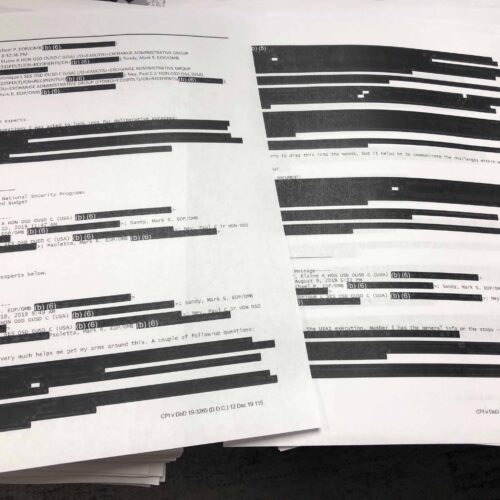

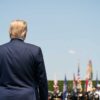
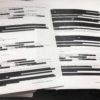
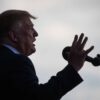
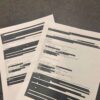
Join the conversation
Show Comments